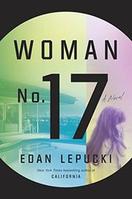
by Edan Lepucki
Simply one of my favorite books. I don't know why, I cannot explain. If you like other books I love, you'll love this one.
I loved the FEEL of it; I don't care if it's "believable" - it was not a thriller I had to put faith in to its plot; it felt great; I was intrigued; I wanted to know these people (although I did not necessarily like them). It's just the sort of author I believe in. Period.
I don't want to hide spoilers, etc., so I'm not going to say anything about the plot except that the ENDING - I mean the last few pages literally - were the most important to me. The explanation of S from the two people who knew her best in the world, that meant everything.
I hope Lepucki writes more and more - and in a way I hope she doesn't. This is the sort of story that cannot be repeated. Possibly. I'm not sure. I have not read California by her and I'm either dying to. Or I'm dreading it.
This is my THING. If anyone can recommend anything "similar", I'm open.
LOVED IT!
Interviewed by Rachel Hurn on May 10, 2017
There are plenty of writers and book lovers who wish they were still in school, but Edan Lepucki might be the only one who dreams about course catalogues.
“I live a pretty staid life. I got married when I was 25. A child bride!” jokes Lepucki, author of Woman No. 17. “I’ve always been a goody-goody—I got the grades, I love to read—so I write about characters who don’t do the wise thing, who are hell-bent on keeping secrets or hurting somebody.”
Woman No. 17 may feel like a departure from the post-apocalyptic world of Lepucki’s New York Times bestselling, Stephen Colbert-endorsed debut California, but it’s actually a return to the true-to-life narratives typical of her work: always about contemporary Los Angeles, where Lepucki is from, and usually about women, many of them mothers. But despite their obvious flaws—maternal ambivalence, intimacy issues, a drink in one hand, the baby monitor in the other—or perhaps because of them, Lepucki’s twisted characters are compulsively readable.
Two voices inhabit this novel, with the perspective shifting back and forth between chapters. Lady is the formerly single mother of a non-verbal son, Seth, now a teenager who lives with her and her toddler, Devin, in a multi-million dollar mansion in the Hollywood Hills, “every sunset a sky of spilled Kool-Aid.” The mansion belongs to Karl, Lady's new husband from whom she's currently separated (her choice, not his). Needing help, she hires S., a recent Berkeley grad, to watch Devin while she works on a book about Seth that she clearly doesn’t want to write. “She can’t write that book, she never could write that book,” Lepucki says, “because she doesn’t understand her son and what his disability is.”
Lady is having a crisis of identity that’s apparently coming from the fact that her life with Karl is too stable: “He takes away her angst,” says Lepucki. And Lady is one of those people who is uncomfortable with comfort, the damage of her former life itching at her, asking to be reopened, or worse, passed on to her children.
S. describes the difference one day when she and Lady are in the pool—“Wealth had made obvious improvements: her hair had more body and her highlights were perfect. Her clothes draped just-so….But Karl and his dough couldn’t smooth her edges. A part of her had shut down or fallen away.”
At first Lady is careful not to share too much of her inner disquiet with S., but she can’t help herself, and soon she and the brazen, unselfconscious nanny cling to each other in the instinctive way that school kids cling, quickly and without much forethought. They become closer than a parent and her nanny should be—on Twitter Lady calls S. “The Sitter,” probably to keep herself from writing “My Best Friend.”
But what Lady doesn’t realize is that she doesn’t know her new companion at all. S. has moved back to L.A. to try to become an artist, experimenting with pretending to be someone else, Talented Mr. Ripley-style. Her true identity is hidden from Lady by a fake self and a put-on name (S. comes from Esther).
“I’ve always been fascinated by Highsmith’s novel and how Tom Ripley kind of puts on another person,” says Lepucki. “That performance, how do you do that literally? I believe that S. can because she’s this shape-shifter person. She doesn’t yet know herself at all.”
Lepucki’s most jarring dichotomy is what she calls her “mother self.” “I pretty much lost my mind when I had my first kid. As in, ‘Who am I now? I’m somebody’s mother, but I’m also my own independent person.’ ” She says that toggling between those roles has gotten easier, but she’s always conscious of the binary existence.
Woman No. 17 is about the various identities that a person can inhabit, either throughout their life, or simultaneously. This is an especially true experience for women, who unfortunately have to define their identities more intentionally than men. As Betty Friedan once wrote, “It is easier to live through someone else than to complete yourself….It is frightening when a woman finally realizes that there is no answer to the question, ‘who am I’ except the voice inside herself.”
Rachel Hurn is a writer, editor, and former bookseller.
 RSS Feed
RSS Feed